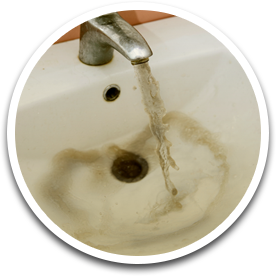Frequently Asked Questions
Frequently Asked Questions About Well Pump Repair, Installation & Water Testing in Ortonville, MI
The LaLone name has been in the water and well industry for over a century, allowing our family members to compile and pass-down knowledge from our predecessors. Well repair, water testing, and well drilling are what we were born to do. With so many storied years in business, our team has the knowledge to answer your water and well questions. Check out some of our frequently asked questions below, and give us a call if you have any more.
Why Do I Have No Water or Low Water Pressure?
Numerous issues can cause low water pressure in a well system. For example, it can be due to a poor aquifer, a low water level, or an encrusted well pump or screen. It's tough to really tell what’s causing your low water pressure without looking at your well water system in person. Call us at (866) 620-0550 so that we can get a team member to your water supply and diagnose the true cause ASAP.
Why Does My Water Have a Foul Smell?
Clean water should not smell bad. Typically, foul-smelling water can be attributed to bacteria in your system. The smell itself can help determine the cause of the odor. For example, if your water smells like sulfur or rotten eggs, then it’s likely been polluted with bacteria. If your water starts smelling like sulfur, sewage, mold, or another unusual odor, it must be tested immediately.
What Is the Average Lifespan of Well Water?
Wells dry up and, therefore, do have an expiration date. However, you shouldn’t be too concerned if it’s a new well. The average drinking well has a lifespan that lasts between 30 to 50 years, meaning that your well will likely be in working condition for quite some time. That is if you maintain it properly and get it repaired whenever necessary.
How Often Should I Have My Well Water Tested?
As recommended by the CDC, it’s important to have your well water tested once a year for total coliform bacteria, nitrates, total dissolved solids, and pH levels. That’s the minimum, though, as you can always test your well for additional contaminants and maximum safety.
You should also have your well tested if you're concerned that an environmental factor affected your well. These can include a problem with nearby wells, a recent flood, a change in your water quality, or a recent repair to your well.
Why Is My Well Producing Black Water?
Black well water is most often caused by an increase in magnesium, but it can also be due to a broken pipe, mildew, or sewage entering your system. Regardless, you should never drink black water. Call us directly at (866) 620-0550 to have your well water tested ASAP.
How Do I Know if My Drinking Water Has Been Contaminated by Rust?
Brown, red, orange, and yellow water can all indicate that rust has entered your well water. However, these colors do not always indicate unsafe drinking water, as some wells may naturally contain irons or magnesium that result in these discolorations. If your well water looks different than usual, it’s important to have it tested.
Does Brown Water Only Indicate Rust?
As black water can indicate various issues, brown water has more causes than rust. Although brown water is less common and typically only occurs in shallow wells, natural tannins can enter well systems of any depth and frequently result in browner well water. Have you ever bitten into an unripe fruit and felt disgusted by the bitter taste or uncomfortable feeling in your mouth? Tannins are the cause of that. They are safe to consume, but their purpose is to deter animals from eating a plant before it is ripe.
Whether you have brown or red water, it's important to have your water tested whenever you discover discolored water. The test results will determine what is causing the water and how to fix it before it becomes a major issue.
What is a Well Water Pump?
A well water pump moves the water from your well through the water lines and into your pressure tank, which is where the water is stored. It's the key to your entire plumbing system when using well water. It knows when to pump by gauging the air pressure in your storage tank, hence the term pressure tank. While different well pumps can use different mechanics, they all function the same way to provide well water to your tap.
How Do I Know I Should Have My Well Pump Repaired?
Simply put, you should have your well pump repaired when you notice it isn't functioning normally. Changes in water pressure, a lack of water, water spitting from your faucets, and unusual sounds from your water pump are all clear signs of an issue. If you have higher utility bills, that can also be a sign of a broken well pump. If you're concerned that your well pump is malfunctioning, call us to investigate.
Contact Michigan's Well Pump Experts
For over 100 years, Mike LaLone Well Service has been Michigan’s #1 choice for well pump service. Our family-owned business is ready to diagnose and fix the issue with your well water supply. Contact us today at (866) 620-0550 and get back to drinking clean, safe, and delicious H20.
To get a quote for a new water well system or repair of your current system, call the Mike LaLone Well Service team at 866.620.0550.

